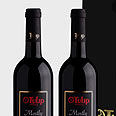
The kosher trend is expanding to the boutique wine industry: This harvest season, Tulip Winery is joining Domaine du Castel, Saslove and Flam wineries in manufacturing kosher wine.
The main reason for the new practice is financial – by making kosher wine, the companies are able to expand their client base both in Israel and abroad. Kosher wine can be sold to more restaurants, hotels, event halls and even to companies that make holiday gift baskets.
"We did the math and realized that we lose 8,000 holiday gift baskets each year because our wine is not kosher," said Roee Yitzhaki, CEO and owner of the Tulip Winery, which has been undergoing the transition to kosher production for over four years.
The transition is not a simple process, and requires considerable investment. The winery must primarily employ religious workers and a full-time kashrut supervisor as well as buy raw kosher materials like yeast and acids. Moreover, the company must invest in automatic machinery for certain winemaking procedures, like wine stirring during fermentation, which must be done continually even on Shabbat.
'Local market matters most'
At Tulip, the transition is even more complex. The winery is based in Kfar Tikva, and employs some of its special-needs residents - a venture of goodwill that has raised the company's popularity. Since these employees are not religious, they cannot be involved in many parts of the kosher manufacturing process, including affixing labels to bottles.
According to Yitzhaki, even the strongest desire to become kosher would not have made the winery dismiss the handicapped employees. Instead, with the help of OK, a US-based kosher certification company, a compromise was reached; the workers will continue to serve, but in approved roles, like maintenance.
Another compromise will keep the winery's visitor center, which offers tastings and sells products, open on Saturdays; the center and the factory itself have been separated.
Hoping for increased demand for their wine, Yitzahki said that the company invested NIS 1.5 million ($421,000) in the transition, which includes the increase in the amount of grapes, installing new technology and moving to a larger facility. The optimism for bigger sales is justified by the rave reviews that Tulip wines receive – Wine Spectator Magazine gave the winery's Syrah Reserve the high grade of 92.
Tulip Winery has manufactured approximately 100,000 bottles, and next year the production will rise to 120,000. Currently the company exports 18% of its products, and the kosher seal is expected to raise the export to 30%.
"There is great demand for kosher Israeli wine in Jewish communities in north America and Europe," Yitzhaki said. "But to me, the local market matters the most."
- Follow Ynetnews on Facebook















